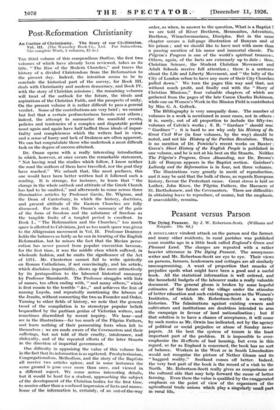Peasant versus Parson
A SINGULARLY virulent attack on the parson and the farmer, and many other residents, in rural parishes was published some months ago in a little book called England's Green and Pleasant Land. The charges are repeated with a rather heavier utterance in The Dying Peasant. The anonymous writer and Mr. Robertson-Scott see eye to eye. Their views on parsons, farmers, landowners and cottages are all similarly uncompromising. A want of proportion that smacks of prejudice spoils what might have been a good and a useful book. All the statistical information is well ordered, and the household budgets of the labourer make a really valuable document. The general gloom is broken by some hopeful estimates of the future of the village under the stimulus of better education and such existing agencies as the Women's Institutes, of which Mr. Robertson-Scott is a worthy historian. The fulminations against existing owners and cultivators and institutions are doubtless intended to arm the campaign in favour of land nationalization ; but if that solution is to have a chance of acceptance, it will come by such routes as Mr. Orwin has indicated, not by the agency of political or social prejudice or abuse of Sunday news- papers. At the best the system of tenure is the least important part of the problem. It is impossible to over- emphasize the ill-effects of bad housing, but even in this regard, so far as England is concerned, the book has no sort of balance. Workers in the West or in South Lincolnshire would not recognize the picture of Nether Gloaze and its " haggard reality." Scotland comes off better. Indeed, the very best part of the book is the record of a visit to the North. Mr. Robertson-Scott really gives us comparisons on the cultural side that may help forward the cause of better farming. Even there the value is qualified by the exaggerated emphasis on the point of view of the organizers of the agricultural trade unions which play a singularly small part in- rural life.














































 Previous page
Previous page